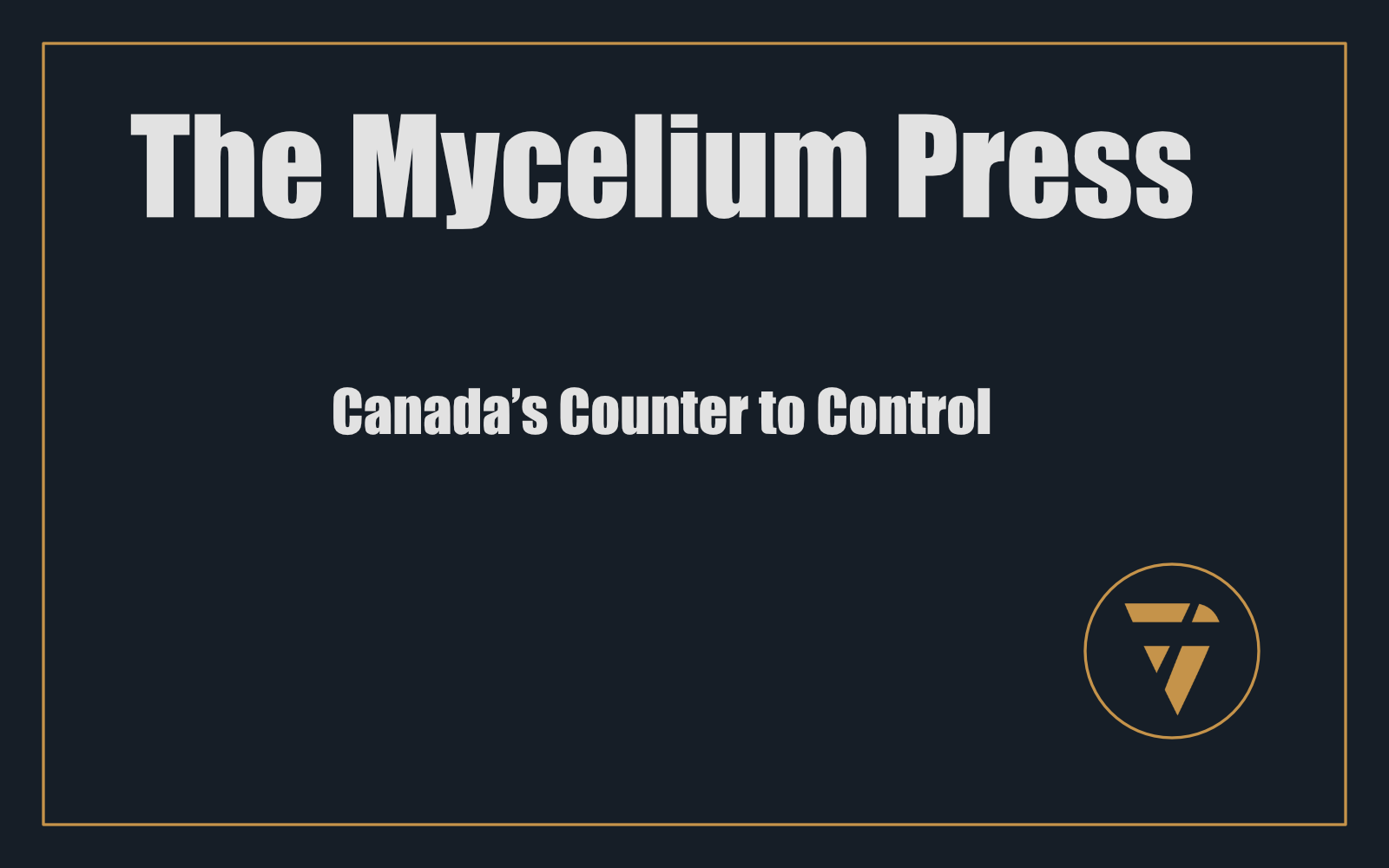The Mycelium Press

Canada’s Counter to Control
Fascism doesn't begin with armies. It begins with silence.
The narrowing of voice. The centralisation of story. The sterilisation of culture into a single channel, where all must look, and all must listen.
Every authoritarian regime in history has understood this truth: control distribution, and you control the people. In Rome, it was the Forum. In medieval Europe, it was the pulpit. In the 20th century, it was the radio, then the television. In the 21st century, it's the algorithm.
Each time, the counter has been the same. Multiply the channels. Decentralise production. Create too many nodes for control to catch.
The printing press was not an invention. It was a detonation. A thousand pamphlets in the hands of farmers and tradesmen shook the foundations of monarchy and church alike. Luther’s theses spread not because they were written, but because they were multiplied, copied, handed down in taverns, stitched into songs, etched into memory. The Enlightenment was not an idea; it was a circulation system.
And now—Canada stands on the precipice of needing its own.
We have mistaken digital abundance for sovereignty. Yes, the internet gave us voice. But the infrastructure is not ours. Servers sit in the United States. Platforms are run by corporations. Algorithms dictate reach. A single policy change can erase a movement. One blackout can silence a city.
Digital is powerful. But digital is not safe.
We must use it, but never rely on it.
The counter to fascism in Canada is not another social platform. It's not another debate on free speech. It's not more hashtags.
It's manufacturing.
It's presses.
It's the Mycelium Network: a distributed web of community-owned production hubs—each one a small printing press, record press, duplicator, or maker shop—embedded in every town, every neighbourhood, every campus, every co-op. Each one alive. Each one linked.
The Architecture
Here’s how it works:
– Nodes (The Local Press Hubs)
Each community has a press: digital book printer, record cutter, zine duplicator, poster press, or a hybrid of all. Locals use it for their own projects—books, art, newsletters—but it also serves as a receiver for national circulation.
– The Network (The Mycelium Exchange)
Every hub is linked digitally, but the output is physical. A manifesto written in Winnipeg can be printed in Halifax tomorrow. A song recorded in Toronto can be pressed into vinyl in Whitehorse the same week.
– Content Sovereignty
This is not about one voice dominating. Each hub creates its own, and each can opt-in to replicate others. Local identity remains strong; national identity emerges through exchange. This is Canada’s antidote to imported culture: instead of consuming American media, we circulate our own.
– The Economy of Artefacts
Every artefact—book, poster, record—carries value. Some are sold, some traded, some gifted. A simple credit system can emerge across the network, but the deeper value is cultural: ownership of story, permanence of message, the physicality of connection.
The power of this model lies in its resilience. Shut down one hub, and another carries the load. Ban a message online, and it still prints in 200 towns. Crash the internet, and the presses keep running.
This is what fascism fears: not opposition, but redundancy. Not protest, but multiplication.
Why Physical Matters
A book can be burned, yes. But before it burns, it must be found. And by the time it's found, it has already passed through a hundred hands.
A record can be broken. But one copy becomes ten, becomes fifty. By the time the police knock, the song is already sung.
A poster can be torn down. But another appears the next morning. And another. And another.
Digital is fast. But physical is sovereign. It resists erasure. It resists apathy. It insists on presence: a book in your hand, a record on your table, a poster on your wall.
A nation without its own physical culture is a nation waiting to be colonised.
Canada’s Position
Canada has drifted into dependence. We import our entertainment, our stories, our myths. We live on American feeds, Chinese platforms, European films. Our own voices exist, but they are scattered, fragile, temporary.
This network is not a nostalgia project. It's real sovereignty. It's continuity. It's the infrastructure for a Canadian culture that cannot be bought, censored, or outsourced.
The Mycelium Press makes Canada ungovernable by uniformity. It ensures no government, no corporation, no algorithm can own the flow of message.
This is not anti-technology. The internet remains the signal wire, the nervous system. But the artefacts—the books, the records, the posters—are the muscle, the bone, the skin. They hold weight. They carry memory. They connect people hand-to-hand, not just screen-to-screen.
The Motion Sequence
We don’t need theory. We need a first move.
- Prototype a Hub
Pick one community. Install one press: a small-scale digital book printer, or a vinyl cutter, or a poster duplicator. Give locals access. Print something that matters. - Launch the First Artefact
Not just content, but a declaration. A manifesto. A simple book, zine, or poster that declares the existence of the network. Ship it to ten communities. Let them replicate. Let them hold it in their hands. - Link the Nodes
Set up a basic digital back-end for coordination: a place where artefacts can be uploaded, queued, and dispatched to hubs. Don’t overbuild. Start with the simplest system: a shared library, a list of active presses, a way to say “print this.” - Expand by Demonstration
Show that it works. The more communities see it, the more they want in. Every new press multiplies the reach. Every artefact proves the system’s inevitability.
The Consequence of Inaction
If we don't build this, Canada drifts further into digital colonisation. Our stories will be algorithmically selected for us. Our movements throttled. Our culture commodified until it dissolves into background noise.
And as fascism rises again—as it always does—it finds us unarmed. Dependent. Divided.
But if we build this network, Canada becomes antifragile. Culture circulates even under blackout. Community persists even under censorship. The people own the means of expression.
This is not a nice-to-have. It's survival.
The Call
The revolution of the printing press was never about ink. It was about power. It was about the people refusing to let their voices be mediated by crown or church.
Now, the revolution of the Mycelium Press is about permanence. It's about sovereignty. It's about refusing to let our voices be mediated by algorithms, platforms, or states.
This is Canada’s counter to fascism.
Not loud. Not centralised. Not fragile.
But everywhere.
Alive in every community.
A network of roots.
A web of presses.
A culture of exchange that no one can own.
This is what I’m working on. Tell me what you think, I enjoy the conversation! Subscribe and follow the work in real time.
Thanks!
B

They centralise to control.
We decentralise to endure.
A press in every community. A network no fascist can erase.
PS -






